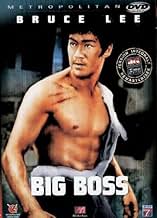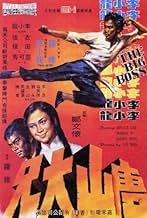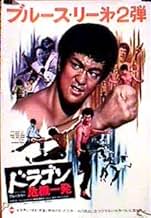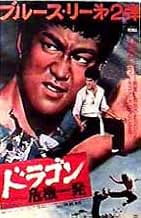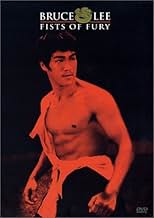AVALIAÇÃO DA IMDb
6,9/10
31 mil
SUA AVALIAÇÃO
Um jovem sob juramento de não cometer atos de violência trabalha com seus primos em uma fábrica de gelo onde eles começam misteriosamente a desaparecer.Um jovem sob juramento de não cometer atos de violência trabalha com seus primos em uma fábrica de gelo onde eles começam misteriosamente a desaparecer.Um jovem sob juramento de não cometer atos de violência trabalha com seus primos em uma fábrica de gelo onde eles começam misteriosamente a desaparecer.
- Direção
- Roteirista
- Artistas
James Tien
- Hsiu Chien
- (as Paul Tien)
Nora Miao
- Drinkstand owner
- (as Miao Ke Hsiu)
Ying-Chieh Han
- Hsiao Mi (Boss Mi)
- (as Han Ying Chieh)
Hua-Sze Li
- Ah Chai
- (as Li Hua Sze)
Marilyn Bautista
- Miss Wuman
- (as Malalene)
Billy Chan
- Ah Pei
- (as Hui-yi Chen)
Chia-Chen Tu
- Third Uncle
- (as Ka-ching To)
Avaliações em destaque
After trying to make a name in Hollywood with the TV series "Green Hornet" with mixed results, young actor and martial artist Bruce Lee traveled back to Hong Kong where his popularity as Kato was very high, there met Raymond Chow and received the chance to star a film about martial arts. "Tang Shan Da Xiong", or "The Big Boss" (known in the U.S. as "Fists of Fury"), was the final result and the movie that started Lee's career and his way to becoming a legend of celluloid.
"The Big Boss" is about a young Chinese man named Cheng Chao-an (Bruce Lee) who travels to Thailand looking for a job. Living with his distant cousins, he finds a job in the ice factory where his cousins work and soon he finds a family in them, developing a close friendship with Hsiu Chien (James Tien) and a big affection for Chow Mei (Maria Yi). Although he is a skilled fighter Cheng sworn an Oath of non-violence to his mother, promising that he would not be a get in fights. However, things get complicated when two of his cousins disappear and is discovered that the ice factory has a dark secret. Cheng will have to break his Oath in order to unveil the mystery behind the disappearance of his new family.
Directed by Wei Lo (who would also discover Jackie Chan), "The Big Boss" was a breath of fresh air to martial arts films as it showed a flawed hero in a modern setting. The story (by Wei Lo and Bruce Lee) is very well developed and filled with suspense and action, and in a bold move for an action film, the main character remains almost inactive for the first half as Cheng must avoid violence due to his oath. The film not only launched Lee's career to stratosphere, it influenced his own film-making's style and the way future martial arts movies were done.
Wei Lo's usually restrained style was also influenced by his young actor's abilities, "The Big Boss" can be seen as his transition to a more explosive way of film-making that would be completed in his next Lee's film ("Fist of Fury") and the subsequent Jackie Chan's films. The natural and raw look of the film added to the high dose of graphic violence (it is probably the goriest film in Lee's career) give the movie a harsh, gritty realism that adds to its charm.
As many have already said (and will continue saying without a doubt), Lee was a very charming actor whose presence filled the screen and owned it completely. That statement is proved here as we see him not as a killing machine, but as a common man who just wants to live peacefully, giving us many scenes of Cheng enjoying his new found family and struggling with his own vices. Lee's performance is very natural although one could say that he was basically playing himself. The rest of the cast ranges from average to OK, with James Tien, Quin Lee and Malalene being the best among them. However, it's fair to notice that the poor dubbing, typical of movies of the era makes a bit difficult to judge them fairly.
"The Big Boss" is considered among the weakest of Lee's films and not without a reason. Those accustomed to constant action scenes will feel it is slow due to the film's pacing and the way the story is built. The acting, as written above, is not very good and only Lee and Tien's performances are of constantly quality. And finally, Wei Lo's inclusion of some silly comedic effects feels terribly out of pace in an otherwise dark and gritty action film.
To summarize, "Tang Shan Da Xiong", or "The Big Boss", is a terrific film on its own right, and together with "Fist of Fury" ("The Chinese Connection") and "Enter the Dragon", a basic film to understand Lee's career and the development of martial arts films during the 70s. It may not be a classic as the films mentioned, but this was just the beginning of the legendary Bruce Lee. 7/10
"The Big Boss" is about a young Chinese man named Cheng Chao-an (Bruce Lee) who travels to Thailand looking for a job. Living with his distant cousins, he finds a job in the ice factory where his cousins work and soon he finds a family in them, developing a close friendship with Hsiu Chien (James Tien) and a big affection for Chow Mei (Maria Yi). Although he is a skilled fighter Cheng sworn an Oath of non-violence to his mother, promising that he would not be a get in fights. However, things get complicated when two of his cousins disappear and is discovered that the ice factory has a dark secret. Cheng will have to break his Oath in order to unveil the mystery behind the disappearance of his new family.
Directed by Wei Lo (who would also discover Jackie Chan), "The Big Boss" was a breath of fresh air to martial arts films as it showed a flawed hero in a modern setting. The story (by Wei Lo and Bruce Lee) is very well developed and filled with suspense and action, and in a bold move for an action film, the main character remains almost inactive for the first half as Cheng must avoid violence due to his oath. The film not only launched Lee's career to stratosphere, it influenced his own film-making's style and the way future martial arts movies were done.
Wei Lo's usually restrained style was also influenced by his young actor's abilities, "The Big Boss" can be seen as his transition to a more explosive way of film-making that would be completed in his next Lee's film ("Fist of Fury") and the subsequent Jackie Chan's films. The natural and raw look of the film added to the high dose of graphic violence (it is probably the goriest film in Lee's career) give the movie a harsh, gritty realism that adds to its charm.
As many have already said (and will continue saying without a doubt), Lee was a very charming actor whose presence filled the screen and owned it completely. That statement is proved here as we see him not as a killing machine, but as a common man who just wants to live peacefully, giving us many scenes of Cheng enjoying his new found family and struggling with his own vices. Lee's performance is very natural although one could say that he was basically playing himself. The rest of the cast ranges from average to OK, with James Tien, Quin Lee and Malalene being the best among them. However, it's fair to notice that the poor dubbing, typical of movies of the era makes a bit difficult to judge them fairly.
"The Big Boss" is considered among the weakest of Lee's films and not without a reason. Those accustomed to constant action scenes will feel it is slow due to the film's pacing and the way the story is built. The acting, as written above, is not very good and only Lee and Tien's performances are of constantly quality. And finally, Wei Lo's inclusion of some silly comedic effects feels terribly out of pace in an otherwise dark and gritty action film.
To summarize, "Tang Shan Da Xiong", or "The Big Boss", is a terrific film on its own right, and together with "Fist of Fury" ("The Chinese Connection") and "Enter the Dragon", a basic film to understand Lee's career and the development of martial arts films during the 70s. It may not be a classic as the films mentioned, but this was just the beginning of the legendary Bruce Lee. 7/10
Fists Of Fury was the second best of the Lee films. (Chinese Connection was tops). The speed, action and excitement in the film was unprecedented. The only thing that came close were the episodes of the Green Hornet and they were Lee also. He was the epitome of being physically fit and had screen presence like no action star before him. His fitness level and physical capabilities are qualities that some action stars have today, but at the time there was no one like him. Fists of Fury had a good story and the acting was good. In the last almost thirty years, you will be able to find films that are equivalent to the technical and production measures of this film, but none as good due to the fact that this was the first.
DHM
DHM
Saw this in a theatre in 1971 and just revisited it 45 years later.
Conclusion:
As a film, it suffers badly from the massive improvements in choreography, skill, and staging that MA films have enjoyed in the interim. What seemed sort of "OK" in a dark theatre in 1971 becomes, after several decades, almost a slow dance of awkward fighting moves, with off-sync sound effects and blows that never seem to connect with anything.
In this instance it is not fair to judge the old by the new ... so, no rating.
And then there is the topic of Mr. Lee.
History tells us that Bruce Lee exploded into Asian cinema on this film and anyone can see why. IT IS AS IF HE IS OPERATING AT A FAST CAMERA SPEED AND THE REST OF THE CAST AT A SLOW CAMERA FEED. Of course, the speed of the camera is the same throughout, it is the speed of the actors that differed.
The cast were the usual bunch that made many dozens of these films in a year. They looked slow and awkward because they actually were slow and awkward.
Mr. Lee on the other hand lived (and ultimately died) for his craft. His whole life was MA and even today the debate continues as where he would have ranked against the best fighters of all time. At the top is my guess.
In essence, this is almost an audition tape for Mr. Lee and not much else. But it is a piece of history and deserves great respect.
Conclusion:
As a film, it suffers badly from the massive improvements in choreography, skill, and staging that MA films have enjoyed in the interim. What seemed sort of "OK" in a dark theatre in 1971 becomes, after several decades, almost a slow dance of awkward fighting moves, with off-sync sound effects and blows that never seem to connect with anything.
In this instance it is not fair to judge the old by the new ... so, no rating.
And then there is the topic of Mr. Lee.
History tells us that Bruce Lee exploded into Asian cinema on this film and anyone can see why. IT IS AS IF HE IS OPERATING AT A FAST CAMERA SPEED AND THE REST OF THE CAST AT A SLOW CAMERA FEED. Of course, the speed of the camera is the same throughout, it is the speed of the actors that differed.
The cast were the usual bunch that made many dozens of these films in a year. They looked slow and awkward because they actually were slow and awkward.
Mr. Lee on the other hand lived (and ultimately died) for his craft. His whole life was MA and even today the debate continues as where he would have ranked against the best fighters of all time. At the top is my guess.
In essence, this is almost an audition tape for Mr. Lee and not much else. But it is a piece of history and deserves great respect.
Cheng Chao-an (Bruce Lee) leaves his Chinese village to join relatives in Thailand. He is greeted by cousin Hsiu Chien who readily fights for others while Cheng promised his mother never to fight again. He joins his relatives at an ice factory owned by drug-lord big boss Hsiao Mi. When two of his cousins find drugs hidden in the ice, they are offered money but they politely refuse. They are killed and their bodies chopped up. Hsu Chien and Ah Pei go to ask questions but then they disappear. The men riot and Cheng is made foreman to appease them. Chiao Mei berates them for forgetting her brother. The boss throws him a party to get him drunk. Chiao Mei runs into him sneaking out of the brothel and the men are not happy that he forgot about Hsu Chien once again. Eventually, the hooker Sun reveals the truth and is killed. The boss's henchmen attack Chiao Mei and the family while Cheng is breaking into the factory. He finds drugs and the hidden bodies. He's confronted by the boss's son and numerous henchmen.
It's a functional kung fu story. The idea that he promised not to fight is great one. It allows him to be on another level when he actually does fight. It also allows him to be human. He gets tricked by the boss. He falls for a hooker. He's restrained by his promise. That makes the fights so much better. It's like he had saved all of his energy for his big fights. The movie is also more brutal and bloodier than I expected. The main thing is that this is a Bruce Lee movie and he shows that he's obviously a superstar. He's burning with charisma and it comes across on the screen.
It's a functional kung fu story. The idea that he promised not to fight is great one. It allows him to be on another level when he actually does fight. It also allows him to be human. He gets tricked by the boss. He falls for a hooker. He's restrained by his promise. That makes the fights so much better. It's like he had saved all of his energy for his big fights. The movie is also more brutal and bloodier than I expected. The main thing is that this is a Bruce Lee movie and he shows that he's obviously a superstar. He's burning with charisma and it comes across on the screen.
After years of trying to get into Hollywood, Bruce Lee returned to Hong Kong and began his efforts with this low-budget martial-arts thriller. The result - an Asian box-office smash which made Lee an overnight sensation in the East. Whilst its not a great film or Lee's best work, it is an definite film classic that really opened the door for the martial-arts genre, as well as kicking off Lee's career. The story sees Lee coming to work in Banghok with his cousins in an ice factory, where he soon discovers sinister operations taking place under the thumb of the title villain. Like Lee's other films, the action builds up through the film to impressively staged fight scenes, all topped by a dramatic, all-out climatic bout between Lee and the Big Boss. Breakthrough stuff but the best (and the West) was yet to come.
Você sabia?
- CuriosidadesBruce Lee endured "two days of hell" when he sprained his ankle badly while landing awkwardly from a jump from a high jump on a slipped mattress, and had to be driven to Bangkok to see a doctor, where he caught a virus in the hot and stuffy conditions. Close-ups were used to finish the fight, as Bruce struggled and had to drag his leg, which was covered up by, and contributed to, his character's worn out, exhausted appearance. He couldn't move properly and was also racked with aches and fever and was having difficulty keeping food down. Even so, filming continued. His twisted ankle meant that he had to drag his injured leg, so in several scenes he had to be filmed in closeup. He also broke a glass in his hand, resulting in a gash that required ten stitches. While at the hospital in Bangkok, he caught flu and rapidly lost ten pounds.
- Erros de gravaçãoWhen the guard dogs leap at Cheng, they are obviously thrown.
- Citações
Cheng Chao-an: Just keep away. Go on. It's not your fight.
- Versões alternativasWhen the film was released in the United States, the death of Hsiao Mi, "The Boss", was cut down to him simply being stabbed in the chest with a knife in order to receive an "R" rating. The original version of his death, which not only shows an explicit close-up of the knife in his chest but Cheng Chao-an's fingers piercing his rib cage and blood flowing from under his shirt, would have given the film an "X" rating. This scene has since been restored for the Bruce Lee Ultimate Collection DVD released by Fox, and the Shout Factory DVD/Bluray releases.
- ConexõesEdited into Jogo da Morte (1978)
Principais escolhas
Faça login para avaliar e ver a lista de recomendações personalizadas
- How long is The Big Boss?Fornecido pela Alexa
Detalhes
Bilheteria
- Orçamento
- US$ 100.000 (estimativa)
Contribua para esta página
Sugerir uma alteração ou adicionar conteúdo ausente

Principal brecha
By what name was O Dragão Chinês (1971) officially released in Canada in French?
Responda


